News
VP Shettima Reiterates FG Commitment To Tackle Challenges Of Power Sector

VP Shettima Reiterates FG Commitment To Tackle Challenges Of Power Sector
By Gloria Ikibah
Nigeria’s Vice President, Kashim Shettima has said that in tackling the issues affecting the power sector, the Federal Government is committed to being a partner to the state governments and facilitating the shift towards increased state government participation in the electricity market as envisioned by law.
The Vice President stated this at a two-day power sector stakeholders interactive dialogue/workshop organised by the House of Representatives Committee on Power on Tuesday in Abuja, with the theme, “Confronting Nigeria’s Power Challenge As The Nation Migrates To A Multi-Tier Market: A Legislative Intervention”.
Shettima who was represented by Sadiq Wanka, said this will require an open channel of communication to adequately plan the transition, and respond to issues as they emerge.
He said: It will require a willingness to leverage all the knowledge that has been accumulated over the last decade of operating the current market structure, and to learn from the mistakes and successes therefrom. It will require a razor-eyed focus on the prize, which is energising Nigerian homes and businesses. The new structure must therefore prioritise providing an enabling environment at the state and wholesale market levels, and allow the private sector to lead the way across the value chain. And of course, it will require the federal and state governments to continue playing a balancing role, ensuring equity and keeping environmental considerations on the front burner.
Shettima who urged that the level of engagement of all stakeholders has to continue to be strong, as there are many issues yet to be resolve; therefore charged industry players to maintain a willingness to learn and adapt.
“In addition to the urgent need to adequately define what the new national electricity framework is, the introduction of new state electricity markets raises two prominent questions:
“The first is how do we ensure state readiness for the increased responsibility they are assuming in the new national electricity framework? While state governments can now regulate all electricity value chain activities within their borders, these new powers come with non-trivial responsibilities. Having the power to set tariff policy within state borders also comes with the responsibility of paying tariff shortfalls and subsidies that emanate from these policies. It comes with the responsibility of state governments guaranteeing payments to the national wholesale electricity market. Having the power to regulate electricity activities also means there is a need to build the capacity to ensure competent and independent regulators in each state market. It means states need to take a leading role in attracting investments to recapitalise distribution companies, and to ensure a steady flow of investments towards increasing electricity access.
“The second key question that becomes immediately apparent is how do we prioritise coordination and orderliness in the transition? It is important that investors have clarity and confidence in the roadmap and timelines for transition and for there to be a base level of standardisation across electricity markets so dealing with different regulatory bodies does not become too cumbersome and force investors to stay away.
“Similarly, there is need for us to maintain a level of flexibility in the transition process. For example, transitioning to state regulatory control requires distribution companies to set up state subsidiaries. But this is not a straightforward process. There are complex issues of asset delineation, equity negotiations with other investors in DISCOs and even infrastructure investments required to truly delineate the distribution network of one state from the other. There is a lot of re-organisation that needs to happen internally within DISCOs from a process and people perspective. All these among others require time and patience”, the VicePresidentstated.
He further said that with the wholesale structural shift that the Electricity Act 2023 (as amended) and the associated constitutional amendment usher in, it means there is the need to double down on ensuring an orderly transition to the new national electricity market framework.
“I congratulate the National Assembly for its steadfastness in leading the conversation through an orderly transition and for demonstrating a willingness to review the recently passed Electricity Act as needed.
According to him, the Electricity Act 2023 seeks to overhaul the structure of the Nigeria Electricity Supply Industry and proposes a structure that promotes more competition.
“The conversation we are having here today at this National Assembly event is very timely. At a moment that the energy quadrilemma is at the forefront of global discussions, in Nigeria, there is widespread recognition that we are underperforming across all four pillars of providing electricity supply that is reliable, affordable, environmentally sustainable and available to all Nigerians. Indeed, by some estimates, less than 20% of Nigerians have access to reliable energy of more than 12 hours per day. 45% of Nigerians have no access to any form of electricity. And as a result, households and industry have been dependent on self-generation that is both more expensive and more polluting.
“The Electricity Act 2023 that was passed by the National Assembly and signed into law by President Bola Ahmed Tinubu seeks to overhaul the structure of the Nigeria Electricity Supply Industry. It proposes a structure that promotes more competition and greater scope for tailoring power solutions to local needs, while transitioning to a market structure that would attract much needed investments and promote environmental sustainability.
“In this regard, I must congratulate the National Assembly for its steadfastness in leading the conversation on this orderly transition and for demonstrating a willingness to review the recently passed Electricity Act as needed. I would also like to congratulate the Honourable Minister of Power for his role in convening industry stakeholders towards the development of the Integrated National Electricity Policy and Strategic Implementation Plan, as envisioned by the new Act. Similarly, the Nigerian Electricity Regulatory Commission has continued to step up to the plate in translating the Electricity Act into enabling regulations that facilitate the transition to a new market structure. State governments have also demonstrated a unique sense of urgency and duty in playing their part towards domesticating the new Electricity Act and improving the energy situation for their populace”, he added.
Vice President Shettima asserted that there is a lot to be excited about with the new Electricity Act, which has the core elements of resolving the structural issues that have hindered investments in the sector – from liquidity challenges, to the inadequate legal framework.
He added that conversations are “key to ensure we are all adequately thinking through the implications of the new Act, and ensuring new structural issues are not being created”.
News
Alleged Terrorism: Judge to issue hearing notice on Nnamdi Kanu case
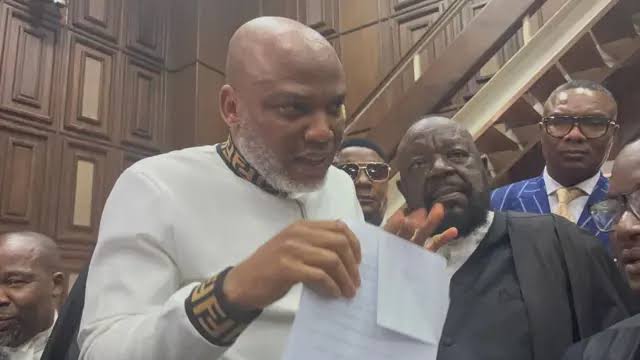
The new judge of the Federal High Court in Abuja who is to handle the treason trial of self-acclaimed leader of proscribed Indigenous People of Biafra (IPOB), Nnamdi Kanu, may issue hearing notices to the parties in the case before the week runs out.
The Nation learnt that the case has now been re-assigned by the Chief Judge of the court, Justice John Tsoho, from Justice Binta Nyako to Justice James Omotosho.
It was not clear last night if the case file had been transmitted to the new judge’s court.
Hearing notices and other relevant information could only be communicated to the parties after the new court would have received the case file, a source told our correspondent.
Also, the court’s Chief Registrar, Sulaiman Hassan, has faulted reports that the new judge, to whom Kanu’s trial has been assigned, has withdrawn from handling it.
In a statement yesterday, Hassan described the report as false and misleading.
The statement reads: “The court unequivocally refutes the false and misleading report, alleging that the Honourable the Chief Judge, the Hon. Justice John T. Tsoho, has stepped down from Nnamdi Kanu’s case and made statements regarding the legality of his arrest.
“This claim is entirely unfounded, fictitious, grossly mischievous, damaging in intent and should be disregarded in its entirety.
“The true position is that the Honourable Justice Tsoho, in his capacity as the Chief Judge, has reassigned Nnamdi Kanu’s case from Honourable Justice Binta Nyako to another (‘new’) judge.
“The report referred to is, therefore, totally spurious.
“The defence team should hence prepare to receive instructions regarding the case, as may be issued by the new judge.
“The Federal High Court strongly cautions against deliberate misinformation to mislead the public and erode confidence in the judicial system.
“We urge the general public to be wary and rely only on verified information from official court sources.
“The court remains steadfast in upholding justice through due process of the law.
“Any further enquiries should be directed to the court’s Information Department.”
News
Terrorism: ECOWAS activates 5,000-strong Standby Force

The Economic Community of West African States (ECOWAS) has activated its Standby Force to curb terrorism and other transborder crimes in the sub-region.
Minister of Defence, Mohammed Badaru, announced this during the 43rd ordinary meeting of the ECOWAS Committee of the Chiefs of Defence in Abuja yesterday.
The meeting was attended by Chiefs of Defence Staff of ECOWAS member countries except Mali, Burkina Faso and Niger, which had withdrawn from the sub-regional body.
Others at the meeting were the ECOWAS Commissioner for Political Affairs Peace and Security, Dr. Abdel-Fatau Musah; Nigeria’s Chief of Defence Staff (CDS), General Christopher Musa; Chief of Army Staff, Lt.-Gen. Olufemi Oluyede; Chief of Naval Staff, Emmanuel Ogalla; Chief of Air Staff, Air Marshal Hasan Abubakar; Chief of Defence Intelligence, Emmanuel Undiandeye; the Inspector General of Police, Kayode Egbetokun, and members of the diplomatic community.
Badaru said the meeting underscored their shared commitment to addressing the critical security challenges confronting the sub-region.
He called on the West African Chiefs of Defence Staff to close ranks to break the cycle of terrorism and armed violence confronting the region.
According to Badaru, by leveraging their collective expertise, resources and commitment, they can make a tangible impact on fostering peace, stability and prosperity in the sub-region.
“In this regard, I am pleased to announce the activation of the ECOWAS Standby Force to combat terrorism in the sub-region,” Badaru said.
“The activation of this force underscores our collective determination to confront the stretch of terrorism with regard to the security of the subregion.
“We must as a sub-region therefore recognise that our strife towards economic growth and development will invariably be fundamental to a home-grown sustainable peace and security.
“We as stakeholders in the sub-region must identify and strictly adjust to the changing order of the global landscape in which emerging threats of terrorism, organised crime, climate change, cybercrime and pandemics respond with respect to our parties.”
ECOWAS Commissioner, Political Affairs, Peace and Security, Dr. Abdel-Fatau Musah, said despite the recent withdrawal of three African countries, the ECOWAS maintains the free movement of persons and goods.
He said: “On 29 January 2025, Mali, Burkina Faso, and Niger formally withdrew their memberships from ECOWAS.
“Following the directives of the Authority of Heads of State and Government at the last Summit in December 2024, the ECOWAS Commission has now initiated a contingency plan to mitigate the unforeseen consequences of their withdrawal.
“I so wish to stress that ECOWAS still has its doors open to welcome back our brothers and sisters from the countries that recently withdrew from our community.
“In this regards, ECOWAS committee of heads of state has directed that despite the withdrawal, ECOWAS must maintain the free movement of people and goods and the rights of settlement and establishment to all citizens of our community, including those from Burkina Faso, Mali and Niger in the spirit of where ECOWAS is going, that is, building a community and a united force of people and we do not want the ordinary citizens of our member states to suffer.”
Musah said the pledges made by the member states were being reconfigured in compliance with the directive to activate the Standby Force in the kinetic mode.
Egbetokun commended the ECOWAS defence forces for playing critical roles in stabilising the region.
“Our collective efforts to enhance regional security, counter transnational threats and promote defence cooperation will no doubt yield possible outcomes for our nation and our people,” he said.
News
Tinubu to Fubara: comply fully with S’Court verdict
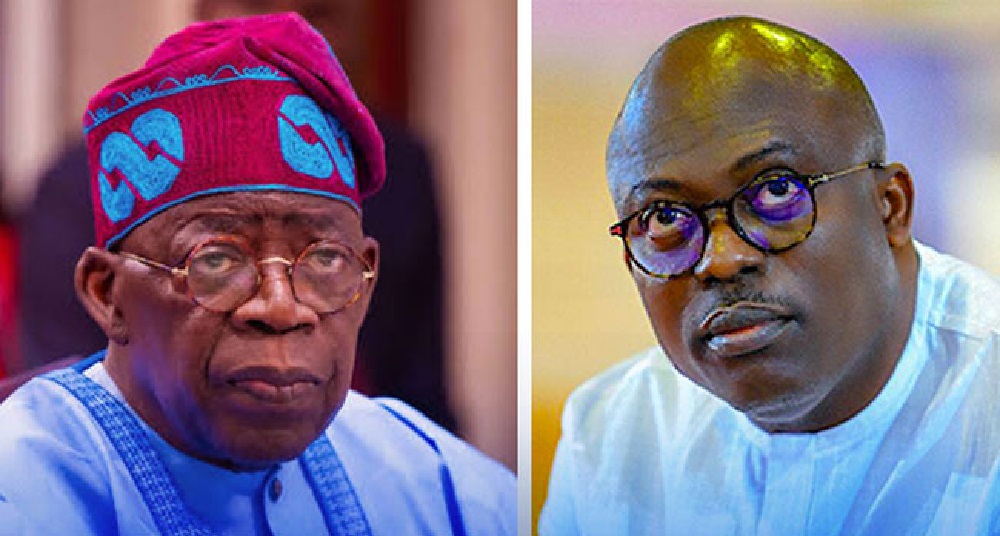
Governor Siminalayi Fubara must comply fully and immediately with the judgment of the Supreme Court to keep the peace in Rivers State, the President declared yesterday.
According to him, the nation is governed by the rule of law without which there will be no order or governance.
President Bola Ahmed Tinubu spoke during a meeting with the delegation of the Pan-Niger Delta Forum (PANDEF) at Aso Villa.
Speaking specifically on the request by the group for intervention in the political logjam, the President put the issue directly on the lap of Fubara.
He said: “Please go back home and help him implement those recommendations within the shortest possible time. I put the ball back in your court. Help him because, privately and openly, I intervened and counselled the governor.
“Only yesterday (Monday), I told him again to pursue the path of peace and stoop to conquer.
“This is a nation governed by the rule of law. I should not be here as the President of the Federal Republic of Nigeria if there was no rule of law. I have total confidence in our judiciary.
“Human beings can make errors, but when the Supreme Court has spoken, that’s it.”
Before the apex court judgment, President Tinubu intervened and got the parties in the crisis to reach an agreement. But it was observed in the breach.
Fubara and his supporters claimed that the agreement was skewed against them.
Since the March 7 apex court judgment, apart from asking council chairmen whose election was declared invalid to vacate office, Fubara has repeatedly promised to comply.
The President further said: “We reached an agreement, a written agreement, and both parties signed. Some leaders thought the governor was wrong to have signed it and didn’t implement it. Where did we find ourselves today?
“I’ve given the situation enough time, enough thinking, enough consideration. We cannot falter, we will not.
“The people of Rivers State must not suffer for the democracy that we all pulled together. They will not, they must be protected. I assure you, we’ll do better.”
Yesterday in Port Harcourt, the governor again promised to implement the judgment.
The House of Assembly led by Martins Amaewhule remained active as it had been since the judgment.
It met with the Niger Delta Development Commission (NDDC) top officials.
The PANDEF big delegation was led by the body’s joint Board of Trustees (BoT) co-chairmen Amanyanabo of Twon-Brass, King Alfred Diete-Spiff, and former Akwa Ibom State Governor Obong Victor Attah.
Also in the delegation was PANDEF chairman Ambassador Godknows Igali.
The President assured the PANDEF leaders of the completion of ongoing projects of his Administration in the Southsouth region.
He said: “Send somebody to go look at what’s going on with the coastal road (Lagos/Calabar). That’s a huge economy and the opportunities associated with it.
“Yes, we’re working with internationally reputable companies to make Uyo Port, Calabar Port, and other Southsouth ports a reality.
“We’re resetting the economy, and it’s tilted far better now. There’s funding for our children in universities, our medical colleges are well-equipped.
“Yes, there’s an infrastructure deficit in some areas, but we will fix it. We’re setting our priorities right.
“With our youthful population, we can achieve the greatest things in Africa. Let us not look at the past wastes, let us learn lessons from it and move forward with this country.
“Whatever remains in these memos that you’ve submitted, I will take a look at them. We’ll meet more regularly.
“Go back home and take charge of peace, and if you need me, let me know.”
The President urged the leaders to support young leaders making strides in community development, citing the work of Dr. Samuel Ogbuku, Managing Director of NDDC.
“Ogbuku, the MD of NDDC, is doing a very good job. Encourage him to achieve more,” President Tinubu said.
King Alfred Papapreye Diete-Spiff thanked the President for his commitment to Southsouth well-being and appointments given to Niger Delta indigenes.
“Your government has taken the bull by the horns, and we are sure you will succeed. We are here to give you our assurance and support. God bless Nigeria and your government,” he said.
Obong Attah called for further intervention in the Rivers crises.
Attah, who also chairs the reconciliation committee set up by PANDEF in Rivers, said the political crisis threatens national stability and deserves more attention.
“Instability there has far-reaching consequences on the peace and stability of the nation,” he added.
He praised the President’s reforms, including power devolution and regional development recognition, and urged focus on infrastructure, seaports, environmental sustainability, and fiscal federalism.
On the delegation were politicians, top government officials, traditional rulers, and senior figures from the zone.
These include many known supporters of Fubara. Among them are: Former Peoples Democratic Party (PDP ) chairman Uche Secondus, former Rivers State Deputy Governor Tele Ikuru; and Prof. Mike Ozakhome (SAN).
Other are: former Cross River State governor, Mr Liyel Imoke; Senator Seriake Dickson; former NDDC Managing Director Timi Alaibe; Jaja of Opobo, Prof. Dandeson Jaja; Senator Ita Enang; Senator Bassey Henshaw; Mrs Ibim Semenitari; Senator Andrew Uchendu; National Coordinator of Host Communities of Nigeria, HOSTCOM, Okareme Maikpobi; Niger Delta activist, Ms Ann-Kio Briggs; spokesman of PANDEF, Chief Obiwevbi Ominimini.
Also in attendance were the Minister of Aviation and Aerospace Development, Festus Keyamo (SAN) and Minister of State for Petroleum (Oil), Senator Heineken Lokpobiri.
-
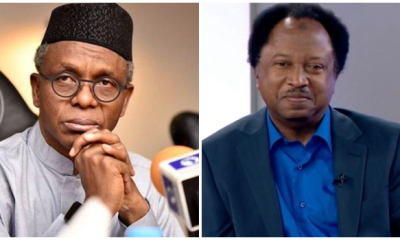
 News24 hours ago
News24 hours agoEl-Rufai Was A Political Liability, His Defection Of No Relevance- Shehu Sani
-

 News12 hours ago
News12 hours ago‘We Gave You Enough Time,’ Wike Orders Residents To Evacuate From Right Of Way
-
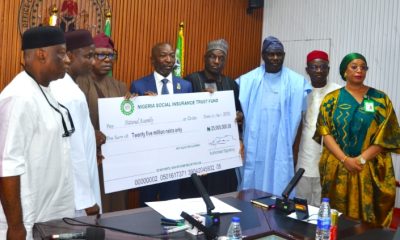
 News10 hours ago
News10 hours agoNSITF vows prompt payment of compensation, presents cheque to National Assembly staff
-

 Politics16 hours ago
Politics16 hours agoEl-Rufai: Mass defection from APC Looming
-

 News15 hours ago
News15 hours agoAbomination ! “I’ve forgiven my wife for sleeping with other men”, says Ijoba Lande
-

 Entertainment18 hours ago
Entertainment18 hours agoPraying five times daily made me dump Islam initially— Actress Habibat
-
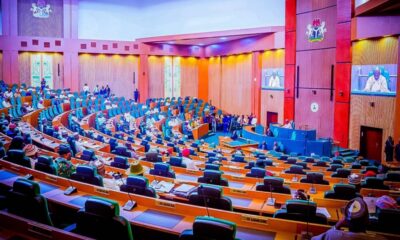
 News16 hours ago
News16 hours agoReps Commend Governor Okpebholo Over Improved Insecurity
-
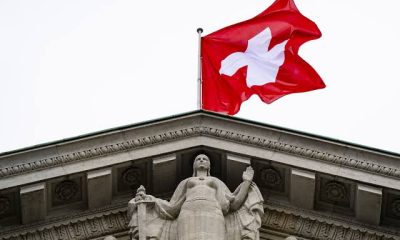
 News23 hours ago
News23 hours agoPanic grips international staff in Geneva as the 80-year old multilateral liberal order begins to crumble






